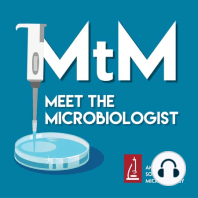24 min listen

MTS12 - Nancy Keller - Aspergillus and the Fungal Toxin Problem
MTS12 - Nancy Keller - Aspergillus and the Fungal Toxin Problem
ratings:
Length:
21 minutes
Released:
Dec 23, 2008
Format:
Podcast episode
Description
Nancy Keller is a Professor of Bacteriology and Medical Microbiology and Immunology at the University of Wisconsin-Madison. A mycologist, Dr. Keller works with a genus of fungi called Aspergillus – many of which are potent plant and human pathogens that produce deadly mycotoxins. Her research focuses on finding those aspects of Aspergillus species that make them effective as pathogens and toxin factories.
Tiny fungi cause big problems for agriculture and human health, and the U.S. alone spends millions of dollars every year to fight the fungi that attack crops. Aspergillus fungi, in particular, cause a problem for crop plants themselves, but the bigger concern is the mycotoxins they produce: aflatoxin is one of the most potent naturally-occurring toxins ever discovered. What’s more, aflatoxin and other Aspergillus toxins are carcinogenic. The bottom line? Exposure to large amounts of these fungal toxins can kill you quickly, and exposure to small amounts can kill you slowly.
On this episode, I talk with Dr. Keller about her work with Aspergillus, why we don’t even know how big the fungal toxin problem is, how reproduction and toxin-making are linked in these fungi, and how we may eventually use viruses as weapons against pathogenic fungi.
Tiny fungi cause big problems for agriculture and human health, and the U.S. alone spends millions of dollars every year to fight the fungi that attack crops. Aspergillus fungi, in particular, cause a problem for crop plants themselves, but the bigger concern is the mycotoxins they produce: aflatoxin is one of the most potent naturally-occurring toxins ever discovered. What’s more, aflatoxin and other Aspergillus toxins are carcinogenic. The bottom line? Exposure to large amounts of these fungal toxins can kill you quickly, and exposure to small amounts can kill you slowly.
On this episode, I talk with Dr. Keller about her work with Aspergillus, why we don’t even know how big the fungal toxin problem is, how reproduction and toxin-making are linked in these fungi, and how we may eventually use viruses as weapons against pathogenic fungi.
Released:
Dec 23, 2008
Format:
Podcast episode
Titles in the series (100)
MTS6 Bruce Rittmann - Microbes, Waste and Renewable Energy by Meet the Microbiologist